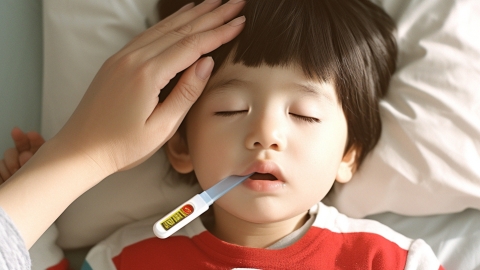What should I do if my baby has a cold and phlegm in the throat?
Generally, when a baby catches a cold and has phlegm in the throat, it may be related to the respiratory tract's self-cleaning mechanism, the baby's underdeveloped swallowing function, acute bronchitis, pneumonia, bronchial asthma, or other factors. It is recommended to seek timely medical attention and follow the doctor's guidance for general treatment, medication, and other therapies. The specific analysis is as follows:

1. Respiratory Self-Cleaning Mechanism
The respiratory tract has a self-cleaning mechanism that clears foreign particles, bacteria, and viruses by secreting mucus. When a baby catches a cold, the respiratory tract becomes irritated, leading to increased mucus production, resulting in a sensation of phlegm in the throat. It is recommended to regularly open windows for ventilation to reduce the growth of bacteria and viruses indoors.
2. Underdeveloped Swallowing Function in Babies
Babies' swallowing function is not yet fully developed, making it difficult for them to completely swallow or cough up phlegm. As a result, phlegm tends to remain in the throat, causing a feeling of phlegm. It is recommended to give the baby warm water frequently during a cold, which helps thin the mucus, making it easier to cough up or swallow.
3. Acute Bronchitis
Acute bronchitis is usually caused by infections such as bacteria, viruses, or mycoplasma. It causes bronchial mucosal congestion and edema, increased secretions, and the formation of phlegm, leading to a sensation of phlegm in the baby's throat. It is often accompanied by symptoms such as coughing, fever, and rapid breathing. Treatment may include medications such as dextromethorphan hydrobromide tablets, pentoxifylline citrate tablets, and combination salbutamol sulfate aerosol, as directed by a physician.
4. Pneumonia
Pneumonia is usually caused by infections such as bacteria, viruses, or mycoplasma. Pneumonia causes lung inflammation, increased mucus secretion, and difficulty coughing up phlegm, which remains in the throat, causing a sensation of phlegm in the baby's throat. It is generally accompanied by worsening cough, difficulty breathing, chest pain, and other symptoms. Treatment may include medications such as cefuroxime axetil tablets, ambroxol hydrochloride oral solution, and paracetamol tablets, as directed by a physician.
5. Bronchial Asthma
Bronchial asthma is generally associated with multiple factors such as heredity and environment. Bronchial asthma causes airway hyperresponsiveness, increased mucus secretion, and difficulty coughing up phlegm, which remains in the throat, causing a sensation of phlegm in the baby's throat. Symptoms such as wheezing, shortness of breath, and chest tightness may also occur. Treatment may include medications such as salbutamol sulfate tablets, budesonide inhalation aerosol, and montelukast sodium tablets, as recommended by a doctor.
In daily life, appropriate complementary foods should be added, and overly greasy or irritating foods should be avoided to help maintain the baby's health.




